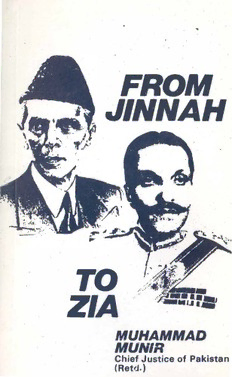
From JINNAH to ZIA [Pakistan 1979] PDF
206 Pages·1980·9.49 MB·English
Most books are stored in the elastic cloud where traffic is expensive. For this reason, we have a limit on daily download.
Preview From JINNAH to ZIA [Pakistan 1979]
Description:
Justice Munir's book FROM JINNAH TO ZIA was appropriately timed for publication in September 1979, the autumn of our discontent. Immediately it was acclaimed by all as a "hard hitting, open and controversial" book. Within weeks it was a runaway bestseller, breaking all publishing records in the country, and going into a second edition before the yearwas out.The book was reviewed with great alarm and hostility by certain sections of the orthodox right wing, while the extremeleft chided the author for being too timid and for showing misplaced concreteness in dealing with the crisis of the Pakistani state. In short, it was received with a blitzkreig of literary, ideological, political and theological criticism. Editorials, front page articles, book reviews and public comments of eminent figures either praised it or condemmed it unequivocally. Such comment has continued to flood and inundate the political and cultural landscape occupied by Justice Munir's view of Pakistani history from Jinnah to Zia.In this book the learned former Chief Justice of the Supreme Court of Pakistan, who first articulated and upheld the famous'law of necessity' (whereby hangs a Pakistani tale), asks the most relevant questions of the time. Was the new Pakistani state a secular or theological one? How have subsequent leaders and regimes visualised the nature of the state, and to what consequence? What is the form and content of the ideology of Pakistan? What is the nature of the relationship between certain political parties, like the Jamaat-i-Islami, and Islam and Pakistan? How will recent amendments to the 1973 Constitution affect the body politic of this country? How can the resurgence of lslam be placed in the wider context of geo-political changes in the Middle East and the SouthAsian region?
See more
The list of books you might like
Most books are stored in the elastic cloud where traffic is expensive. For this reason, we have a limit on daily download.
